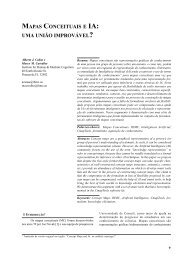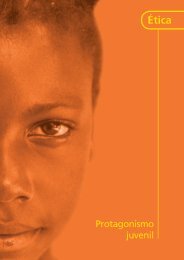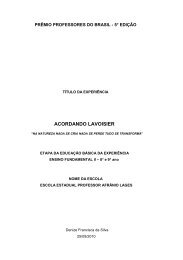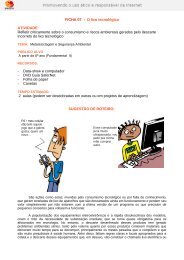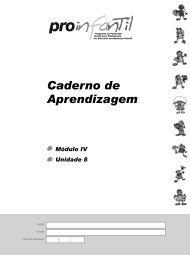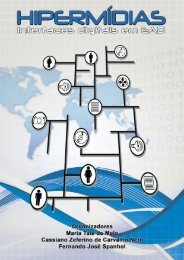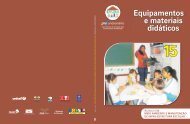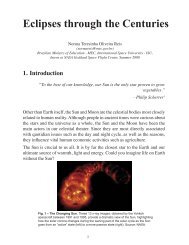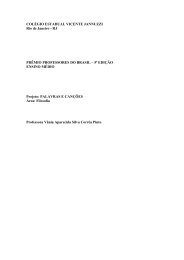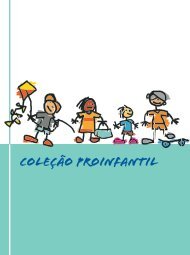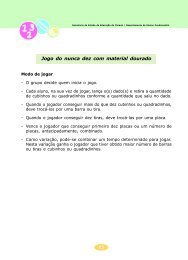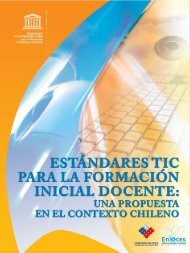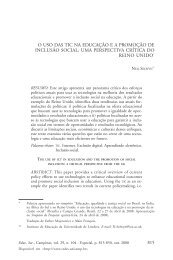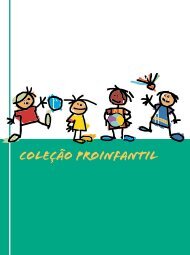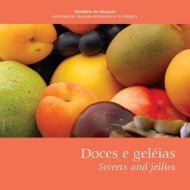BIO-CULTURAL COMMUNITY PROTOCOLS - Portal do Professor
BIO-CULTURAL COMMUNITY PROTOCOLS - Portal do Professor
BIO-CULTURAL COMMUNITY PROTOCOLS - Portal do Professor
Create successful ePaper yourself
Turn your PDF publications into a flip-book with our unique Google optimized e-Paper software.
PART III / CHAPTER 7<br />
Locke also remains one of the exemplar philosophers of<br />
the 17th and 18th century, a period in which many of our ideas<br />
of selfhood emerges. In many ways, the question of personal<br />
identity was the primary question that motivated Locke’s<br />
enquiry…While the question of personal identity troubled<br />
many philosophers even before Locke, it was only with the<br />
publication of Locke’s Two Treatises on Government and<br />
Essay Concerning Human Understanding that you have<br />
the establishment of the most coherent argument linking<br />
theories of identity to property. If property is both an<br />
extension and a pre requisite of personality then we should be<br />
aware of the possibility that different modes of property may<br />
be seen as generally encouraging different modes<br />
of personality. 4<br />
Mauss in his work when analyzing the giving of gifts in<br />
traditional societies was emphasizing their inalienability<br />
from the giver. The gift can therefore never become a<br />
commodity that is separate from the person who gives it, but<br />
rather the very act of giving creates a social bond with an<br />
obligation to reciprocate on the part of the recipient.<br />
While property jurisprudence that underlies FPIC in contract<br />
law emphasizes the rights of the legal subject to alienate an<br />
object that s/he owns, the nature of the gift in traditional<br />
3. Towards a Biocultural Jurisprudence<br />
The trade route is the Songline’ said Flynn, ‘Because songs, not<br />
things are the principle medium of exchange. Trading in “things”<br />
is the secondary consequence of trading in song’. Before the<br />
whites came, he went on, no one in Australia was landless,<br />
since everyone inherited as his or her private property a stretch<br />
of the Ancestor’s song and the stretch of country over which<br />
the song passed. A man’s verses were his title deeds to territory.<br />
He could lend them to others. He could borrow other verses in<br />
return. The one thing he couldn’t <strong>do</strong> was sell of get rid of them.<br />
Bruce Chatwin, The Songlines<br />
Property jurisprudence when dealing with ILCs is estranged.<br />
This estrangement taints even the best-intentioned efforts<br />
of the different international environmental laws and polices<br />
<strong>BIO</strong>-<strong>CULTURAL</strong> JURISPRUDENCE<br />
societies is an example of customary law where a gift is an<br />
affirmation of a relationship that obliges reciprocation,<br />
the gift therefore can never become a commodity in the strict<br />
sense of the word since it is always tied to the giver through<br />
the obligations it creates in the receiver.<br />
Mauss by observing the culture of gifts amongst the<br />
Maori and in Polynesia established the very opposite of<br />
commodification that ‘the bond created between things<br />
is in fact a bond between persons, since the thing itself is<br />
a person or pertains to a person’. Hence it follows that to<br />
give something is to give a part of oneself. In this system<br />
of ideas one gives away what is in reality a part of one’s<br />
nature and substance, while to receive something is to receive<br />
a part of someone’s spiritual essence. 5<br />
Social, cultural and<br />
spiritual bonds that underlie gifts in traditional societies also<br />
underlie relationships bio-cultural communities have with<br />
their knowledge, lands, territories and resources, which are<br />
the heart of their conservation and sustainable use practices.<br />
Therefore the right to FPIC in the context of Article 8(j) for it<br />
to truly affirm the way of life of bio-cultural communities<br />
has to underpin the right to consent in accordance with<br />
the customary laws and values of these communities 6<br />
that attempt to secure the interests of ILCs. Estrangement in<br />
environmental law and policy is generally manifested in<br />
paternalistic attempts at protecting the rights of ILCs, without<br />
addressing the root of the matter, which is securing the<br />
foundations that support a way of life i.e. self-determination<br />
and customary law.<br />
It is possible that causes of legal estrangement are cognitive,<br />
due to certain habits of legal thinking that determine what is<br />
observed and what is ignored when property jurisprudence<br />
encounters ILCs. An effective counter to property jurisprudence<br />
is a bio-cultural jurisprudence that takes as its starting point<br />
the right of bio-cultural communities to determine their way<br />
of life in accordance with their customary and spiritual values.<br />
4. Lawrence Liang et al. ‘How Does an Asian Commons Mean?’ . See also Etienne Balibar, My self and My own: One and the Same? In Bill Maurer & Gabriele Schwab,<br />
Accelerating Possession: Global Futures of Property and Personhood, New York: Columbia University Press, 2006.<br />
5. Mauss, Marcel, The Gift: Forms and Functions of Exchange in Archaic Societies, Norton Library: New York, 1967, p.10.<br />
6. Hyde, Lewis, The Gift: Imagination and the Erotic Life of Property, Ran<strong>do</strong>m House: New York, 1983.<br />
71



